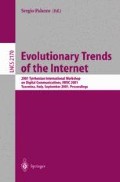Abstract
Endpoint admission control is a mechanism for achieving scalable services by pushing quality-of-service functionality to end hosts. In particular, hosts probe the network for available service and are admitted or rejected by the host itself according to the performance of the probes. While particular algorithms have been successfully developed to provide a single service, a fundamental resource stealing problem is encountered in multi-class systems. In particular, if the core network provides even rudimentary differentiation in packet forwarding (such as multiple priority levels in a strict priority scheduler), probing flows may infer that the quality-of-service in their own priority level is satisfactory, but may inadvertently and adversely affect the performance of other classes, stealing resources and forcing them into quality-of-service violations. This issue is closely linked to the network scheduler as the performance isolation property provided by multi-class schedulers also introduces limits on observability, or a flow’s ability to assess its impact on other traffic classes. In this paper, we study the problem of resource stealing in multi-class networks with end-point probing. For this scalable architecture, we describe the challenge of simultaneously achieving multiple service levels, high utilization, and a strong service model without stealing. We propose a probing algorithm termed ε-probing which enables observation of other traffic classes’ performance with minimal additional overhead.We next develop a simple but illustrative Markov model to characterize the behavior of a number of schedulers and network elements, including flow-based fair queueing, class-based weighted fair queueing and rate limiters. Finally, we perform an extensive set of simulation experiments to study the performance tradeoffs of such architectures, and to evaluate the effectiveness of ε-probing.
Susana Sargento is supported by Ph.D. scholarship PRAXIS XXI/BD/15678/98. Edward Knightly is supported by NSF CAREER Award ANI-9733610, NSF Grants ANI-9730104 and ANI-0085842, a Sloan Fellowship, and Texas Instruments.
Access this chapter
Tax calculation will be finalised at checkout
Purchases are for personal use only
Preview
Unable to display preview. Download preview PDF.
References
G. Bianchi, A. Capone, and C. Petrioli. Throughput analysis of end-to-end measurementbased admission control in IP. In Proceedings of IEEE INFOCOM 2000, Tel Aviv, Israel, March 2000.
S. Blake et al. An architecture for differentiated services, 1998. Internet RFC 2475.
L. Breslau, S. Jamin, and S. Shenker. Comments on the performance of measurement-based admission control algorithms. In Proceedings of IEEE INFOCOM 2000, Tel Aviv, Israel, March 2000.
L. Breslau, E. Knightly, S. Shenker, I. Stoica, and H. Zhang. Endpoint admission control: Architectural issues and performance. In Proceedings of ACM SIGCOMM 2000, Stockholm, Sweden, August 2000.
C. Cetinkaya and E. Knightly. Scalable services via egress admission control. In Proceedings of IEEE INFOCOM 2000, Tel Aviv, Israel, March 2000.
V. Elek, G. Karlsson, and R. Ronngren. Admission control based on end-to-end measurements. In Proceedings of IEEE INFOCOM 2000, Tel Aviv, Israel, March 2000.
R. Gibbens and F. Kelly. Distributed connection acceptance control for a connectionless network. In Proceedings of ITC’ 99, Edinburgh, UK, June 1999.
E. Knightly and N. Shroff. Admission control for statistical QoS: Theory and practice. IEEE Network, 13(2):20–29, March 1999.
K. Nichols, V. Jacobson, and L. Zhang. Two-bit differentiated services architecture for the Internet, 1999. Internet RFC 2638.
K. Ross. Introduction to Probability Models. Academic Press, 1997.
I. Stoica, S. Shenker, and H. Zhang. Core-Stateless Fair Queueing: A scalable architecture to approximate fair bandwidth allocations in high speed networks. In Proceedings of ACM SIGCOMM’ 98, Vancouver, British Columbia, September 1998.
I. Stoica and H. Zhang. Providing guaranteed services without per flow management. In Proceedings of ACM SIGCOMM’ 99, Cambridge, MA, August 1999.
J. Wroclawski. Specification of the controlled-load network element service, 1997. Internet RFC 2211.
L. Zhang, S. Deering, D. Estrin, S. Shenker, and D. Zappala. RSVP: A New Resource ReSerVation Protocol. IEEE Network, 7(5):8–18, September 1993.
Z. Zhang, Z. Duan, L. Gao, and Y. Hou. Decoupling QoS control from core routers: a novel bandwidth broker architecture for scalable support of guaranteed services. In Proceedings of ACM SIGCOMM 2000, Stockholm, Sweden, August 2000.
Author information
Authors and Affiliations
Editor information
Editors and Affiliations
Rights and permissions
Copyright information
© 2001 Springer-Verlag Berlin Heidelberg
About this paper
Cite this paper
Sargento, S., Valadas, R., Knightly, E. (2001). Resource Stealing in Endpoint Controlled Multi-class Networks. In: Palazzo, S. (eds) Evolutionary Trends of the Internet. IWDC 2001. Lecture Notes in Computer Science, vol 2170. Springer, Berlin, Heidelberg. https://doi.org/10.1007/3-540-45400-4_14
Download citation
DOI: https://doi.org/10.1007/3-540-45400-4_14
Published:
Publisher Name: Springer, Berlin, Heidelberg
Print ISBN: 978-3-540-42592-2
Online ISBN: 978-3-540-45400-7
eBook Packages: Springer Book Archive

